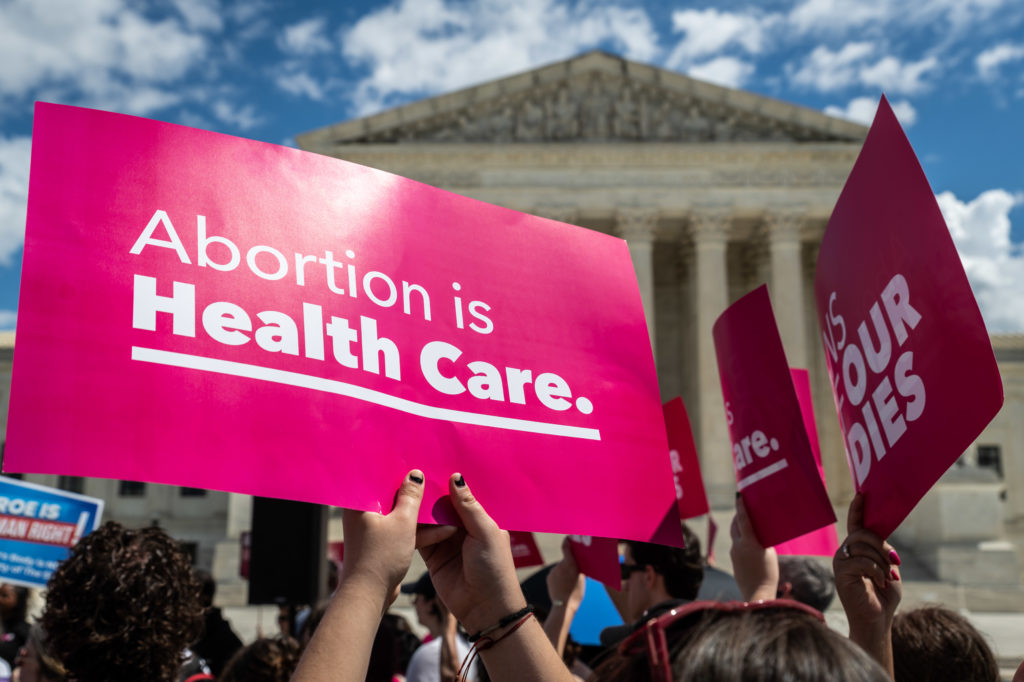Missouri Abortion Laws - Navigating The Complex Legal Landscape
Abortion laws have been a subject of ongoing debate and controversy across the United States, with each state having the authority to establish its own regulations surrounding this sensitive issue. Missouri abortion laws, like many other states shape the access to and provision of abortion services within its borders.
Author:K. N.Oct 10, 202339.3K Shares554.1K Views

Abortion lawshave been a subject of ongoing debate and controversy across the United States, with each state having the authority to establish its own regulations surrounding this sensitive issue.
Missouri abortion laws, like many other states shape the access to and provision of abortion services within its borders.
These laws reflect a complex interplay of legal, ethical, and political considerations, and they significantly impact the reproductive rights and healthcare options available to individuals within the state.
In this article, we delve into the Missouri abortion laws, examining their history, key provisions, legal challenges, and the broader implications for women's health and rights.
Understanding the intricacies of these laws is essential for anyone seeking to navigate the landscape of reproductive healthcare in Missouri.
Missouri Abortion Laws
Dobbs v. Jackson Women's Health Organization, decided in June 2022, overturned Roe v. Wade and returned to the states the authority to regulate or prohibit abortion.
The Missouri trigger prohibition is currently in effect. The state of Missouri prohibits all abortions, with the exception of medical emergencies.
Given how laws are written, it can be difficult for non-attorneys to comprehend their rights and responsibilities under the law. The following chart outlines the fundamental provisions of Missouri's abortion law.
- Statute- Missouri Revised Statutes: Title XII, Section 188.017
- Statutory Definition of Abortion- Abortion is the act of using or prescribing any instrument, device, medicine, drug, or other means or substance with the intent to extinguish the life of an embryo or fetus in the uterus; or abortion is the intentional termination of a mother's pregnancy using or prescribing any instrument, device, medication, drug, or other means or substance for purposes other than increasing the likelihood of a live birth or removing a deceased unborn child.
- Illegal- No abortion, except in medical emergencies (a condition that, based on reasonable medical judgment, so complicates the medical condition of a pregnant woman as to necessitate the immediate termination of her pregnancy to prevent her death or for which a delay creates a substantial risk of substantial and irreversible physical impairment of a major bodily function of the pregnant woman).
- Penalty for Unlawful Abortion- Class B felony (five to 15 years)
Missouri Abortion Restrictions
As of June 28, 2022, the following abortion restrictions were in force in Missouri:
- If Roe v. Wade were repealed, abortion would be illegal.
- A patient must first undergo state-mandated counseling, which contains material meant to dissuade the patient from having an abortion, and then wait 72 hours before the operation may be performed. Counseling must be offered in person and before the waiting period starts, requiring two visits to the institution.
- Unless consumers acquire an extra rider at an additional cost, private insurance plans only cover abortion in instances of life endangerment.
- Health plans available via the state's health market under the Affordable Care Act may only cover abortion in life-threatening situations.
- Abortion is only covered in public employee insurance policy in situations of imminent bodily harm.
- It is illegal to utilize telemedicine to provide abortion drugs.
- Before an abortion may be performed on a minor, the parent must agree.
- Only in circumstances of life endangerment, rape, or incest is public financing allowed for abortion.
- Abortion is illegal, except in circumstances of life-threatening emergencies or when the patient's health is seriously impaired.
- Abortions conducted for the purpose of racial or sex selection, or in reaction to a genetic aberration, are illegal in the state.
- The state imposes needless and onerous regulations on abortion facilities' physical property, equipment, and employees. Abortion providers must also have admitting privileges at a nearby hospital.

Group of faith leaders sue challenging Missouri abortion law
Can Missouri Voters Restore Abortion Rights In 2024
Missouri is set to restore abortion rights through constitutional amendments aimed at safeguarding reproductive rights, including pregnant women's rights and access to birth control. These proposals aim to change the current abortion landscape in the state, which has stringent regulations.
The Missourians for Constitutional Freedom initiative, championed by the group, aims to ensure public support and make the amendments to the ballot. The proposed amendments aim to undo some of the restrictions and restore reproductive rights.
If successful, Missouri's abortion laws could undergo a significant transformation, allowing the Legislature and state agencies to impose restrictions on abortion while respecting individuals' autonomous decision-making.
However, opponents, primarily Republican lawmakers, are working to raise the threshold for amending the state Constitution to 60%, which could complicate the passage of these proposals.
Missouri's potential move to restore abortion rights falls within a larger national movement, with several states implementing advocacy efforts to secure or maintain abortion rights through ballot measures or legal challenges.
The future of abortion rights in Missouri depends on the results of these proposed amendments and the decisions of voters.
Impact On Reproductive Rights
The proposed constitutional amendments in Missouri hold significant implications for reproductive rights within the state. Advocates argue that these amendments are crucial for restoring access to abortion and protecting pregnant individuals' rights.
If successfully passed and implemented, these amendments would mark a turning point in Missouri's stance on abortion regulations, which has been marked by strict restrictions and limited access.
- Restoring Abortion Access -The proposed amendments aim to restore abortion rights that were curtailed by previous legislation, particularly the law that effectively banned most abortions unless there was a medical emergency. The amendments seek to provide pregnant individuals with the right to make decisions regarding their reproductive health without excessive government interference.
- Expanding Access to Reproductive Healthcare -Alongside restoring abortion rights, the amendments also emphasize access to birth control and reproductive healthcare services. This broader approach aims to address the comprehensive needs of individuals seeking reproductive care, ensuring that they have the resources and options necessary to make informed choices.
- Protecting Autonomy and Decision-Making -The amendments underscore the importance of autonomous decision-making when it comes to reproductive choices. By emphasizing that restrictions can only be imposed if they align with widely accepted clinical standards and do not infringe on an individual's autonomy, the amendments prioritize the fundamental right of pregnant individuals to make decisions about their own bodies.
- Potential Legal Battles -If the amendments are passed and eventually added to the state's Constitution, they may face legal challenges from groups and individuals opposed to abortion rights. These challenges could further shape the landscape of reproductive rights within the state, potentially leading to court battles that determine the legality and enforceability of the amendments.
- National Implications -The success or failure of these proposed amendments could influence discussions on reproductive rights at the national level. As part of a larger conversation about abortion access, the amendments may contribute to ongoing debates surrounding the protection of reproductive rights and autonomy across the United States.
- Social and Cultural Impact -The amendments could also have an impact on the social and cultural narratives surrounding reproductive rights in Missouri. Depending on their outcome, they may shape public discourse, attitudes, and awareness about abortion, reproductive healthcare, and individual freedoms.
Challenges And Countermeasures
The proposed constitutional amendments in Missouri, aimed at restoring abortion rights and expanding reproductive healthcare access, are not without their challenges.
The road to implementing these changes is likely to be met with resistance from various quarters, necessitating countermeasures to address these challenges effectively.
Political Opposition
Given the contentious nature of abortion-related issues, the proposed amendments may face strong opposition from anti-abortion groups, lawmakers, and individuals who hold conservative views.
To counter this, proponents of the amendments need to build a robust coalition of supporters, engage in effective public education campaigns, and emphasize the importance of preserving individual autonomy in reproductive decision-making.
Legal Battles
If the amendments are passed and added to the state Constitution, legal challenges are almost inevitable. Opponents may file lawsuits to challenge the constitutionality of the amendments, leading to lengthy court battles.
Advocates should be prepared to defend the amendments in court, ensuring that they are backed by solid legal arguments and comprehensive research.
Public Perception And Stigma
Changing public perceptions about abortion and reproductive rights is a complex task. Overcoming decades of stigma and misinformation requires strategic communication efforts that present accurate information, share personal stories, and address misconceptions.
These efforts can help normalize discussions about reproductive choices and contribute to a more empathetic and informed public discourse.
Balancing Healthcare Regulations
The amendments aim to strike a balance between protecting reproductive rights and maintaining appropriate healthcare regulations. Crafting language that accommodates both goals while addressing concerns from opponents can be challenging.
Experts in both healthcare and law need to collaborate to ensure that the amendments are clear, legally sound, and aligned with best practices in medical ethics.
Engaging Diverse Communities
Missouri is a state with diverse communities, each with its own perspectives on reproductive rights. Effective engagement with these communities, including rural and marginalized populations, is vital.
Tailored outreach efforts, culturally sensitive messaging, and collaboration with community leaders can help ensure that a wide range of voices are heard and represented.
Navigating Political Landscape
The political climate in Missouri can influence the fate of the proposed amendments. Changes in leadership, shifts in public sentiment, and legislative dynamics could impact the trajectory of the amendments.
Advocates should be prepared to adapt their strategies based on the evolving political landscape.
Economic And Resource Challenges
Advocacy efforts, legal battles, and public awareness campaigns require substantial resources. Securing funding and managing resources effectively will be crucial for sustained efforts to support the amendments.
People Also Ask
What Are The Current Abortion Laws In Missouri?
The current abortion laws in Missouri include mandatory waiting periods, parental consent for minors, and restrictions on late-term abortions. These laws have faced legal challenges and debates over their constitutionality and impact on women's reproductive rights.
How Do Missouri Abortion Laws Compare To Neighboring States?
Missouri's abortion laws are often considered more restrictive compared to some of its neighboring states. This has led to discussions about the potential for women to travel across state lines seeking access to different reproductive healthcare options.
What Is The "heartbeat Bill" In Relation To Missouri's Abortion Laws?
The "heartbeat bill" in Missouri refers to a proposed law that would ban abortions once a fetal heartbeat is detected, usually around six weeks of pregnancy. It has been a contentious issue, sparking debates over the definition of viability and women's access to abortion services.
Have There Been Any Recent Legal Challenges To Missouri's Abortion Laws?
Yes, there have been several recent legal challenges to Missouri's abortion laws. These challenges often center around the constitutionality of restrictions such as waiting periods and clinic regulations. The outcomes of these cases have significant implications for women's reproductive rights in the state.
How Do Missouri Residents View The State's Abortion Laws?
Public opinion on Missouri's abortion laws varies. Some residents support the restrictions, citing religious or moral beliefs, while others argue for more lenient laws to ensure women's autonomy and healthcare access. Surveys and polls indicate a complex spectrum of viewpoints within the state.
Final Thoughts
The Missouri abortion laws play a pivotal role in shaping the reproductive rights landscape within the state.
These regulations have sparked ongoing debates and legal challenges, reflecting the broader nationwide discussion surrounding a woman's right to choose and the balance between individual autonomy and state interests.
The evolving nature of these laws underscores the complex interplay between legal, ethical, and societal considerations, making it a topic that will likely continue to be at the forefront of public discourse and legal action.

K. N.
Author
Latest Articles
Popular Articles